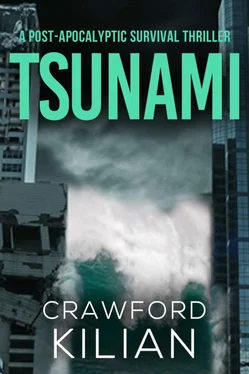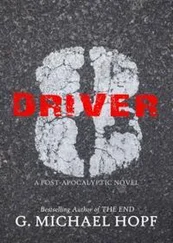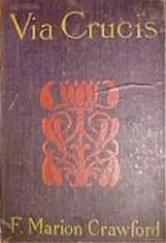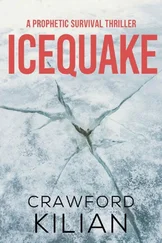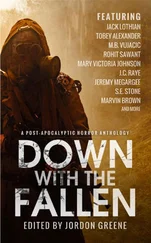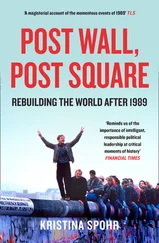“How are your livestock doing?” Allison asked, though he knew they must be alive — his passenger smelled strongly of cowshit.
“They’re mostly well, praise God.”
“Hell of a time to be ranching, though.”
“It’s the time of Tribulation, sir. We bear what the Lord sends us. Are you saved, sir?”
“Afraid not.”
“I’ll pray for you. And I’ll ask Mr. Lamb to pray for you too. Once you’re saved, these troubles don’t burden you.”
“Who’s Mr. Lamb?”
“He’s our leader. A very holy man. He’s drawn us together here to care for one another and endure the Tribulation.”
Allison was tempted to wonder whether a truly holy man would hole up on Escondido Creek when the world outside was falling apart; but he had wasted too much of his youth arguing with cranks and cultists in the film business to bother arguing. He said nothing, and the young man fell silent also. The Mercedes hissed through the rain.
Carmel, with its kitschy dollhouse roofs among the pines, had all the charm of an out-of-season amusement park. A hand-lettered sign had been stuck into the gravel shoulder of the road: NO WORK KEEP GOING. The hospitality of Old California, Allison reflected, didn’t extend to unemployed drifters.
North of the town, Highway 1 was really deserted, and he drove fast until he reached Monterey. With the tourist trade dead, the city was sustaining its revenues by nailing speeders; Allison kept carefully within the limit.
“Where can I drop you?” he asked.
“Anywhere along here will be fine, sir.” Allison pulled over to the curb. Three men, loafing in the entrance to a bar, stared opaquely at the car. Out-of-town drifters could be chased away, but not the local boys.
The young man put out a big, calloused hand. “Thank you, sir. May God bless and keep you.”
“And you,” Allison replied solemnly. The kid was a zombie, all right, but a likeable one. Put a machete in his hand and he’d make a great psychopathic killer, stalking the unbelievers. Too bad you couldn’t make a nickel from a religious-nut movie any more, not with half the audience just as cracked as this kid but not so polite.
Allison accelerated again as he passed the shabby storefronts of Seaside. The few businesses still open had heavy wire screens over their windows, and signs on their doors: Guard Dog on Duty, Max. Two Customers in Store at a Time, Clerk Is Armed. Tough times. The only laugh anyone had had in ages had been President Wood’s inaugural boast that the recession would be over in sixty days. That had been three weeks ago; nothing had changed yet, except that people had stopped saying “recession” and started saying “depression,” just like the Reagan years.
Highway 1 curved northeast around Monterey Bay. The view was spectacular, even in the rain: to the west the long dark arm of the peninsula, to the north the open grey waters of the bay, to the northeast the long dunes that marched along the coast. Out in the bay he saw a tanker coming in to its offshore moorage, three or four miles due west of the refinery at Moss Landing. A monster, one of the half-million-tonners that had come out of moth balls recently. With almost no oil coming out of the Middle East anymore, the North Slope of Alaska had become crucially important; tankers were running up and down the coast nonstop, but even so the supply was never enough. To overcome the bottleneck, they were even refining some of the oil in Valdez and sending it down as gasoline and diesel fuel. Allison toyed with the idea of a tanker-hijack story; half a million tons of gasoline would be worth a hell of a lot these days, when it cost six dollars a gallon with a ration card, and fifteen on the black market. Well, save it for later —
He was at Fort Ord. To his right were the boxy little prefabs of married-personnel housing; to his left, the firing ranges, closed off from the sea by steep dunes. Despite the rain, many of the ranges were in use. Most of the trainees were blacks; the whites stood out because of the anti-sunburn ointment on their faces. They all looked wet and miserable. The irregular popping of rifle fire made him think again about buying some guns; it was getting easy to imagine Shauna being pulled from her car and raped, himself being beaten up by some mob. Paranoia — the stock response of the middle class in hard times.
The three black guards at the main gate looked a little paranoid too: brisk, alert, suspicious. Even in the rain, their sunglasses looked more sinister than silly. They checked his driver’s licence, car registration and credit cards, made a phone call, and only then allowed him through.
A disquieting thought occurred to Allison: how the hell could he shoot exterior scenes in a war movie, when white actors would sunburn in minutes and risk snow blindness in an hour? Make-up — he’d have to get his make-up people working on it. Most of the filmmakers he knew were convinced everything would be back to normal by spring; Allison’s intuition told him nothing would be back to normal for a long time. And he trusted his intuition. Three times now, he had guessed — known — what kind of movie would be popular in two years, and each time he’d been right. The last one, Gunship , had been such a screaming success that he’d let himself be pressured into another war movie even though it hadn’t felt right.
The hell with it. The Longrangers had a good script, a small cast and a modest budget. It would still turn a profit and stir up the critics. Then he could sit back and choose the next project without so much hassle —
Doublethinking. The world is coming to an end tomorrow, but next week will be fair and warmer.
He parked outside the Officers’ Club, a rambling two-story building with the mandatory stucco walls and red-tile roof, and walked slowly across the lot to the front doors. Discipline. You don’t lose your cool, you don’t run, least of all when you’ll get wet anyway.
A young second lieutenant, freckled and sunburned, was waiting for him. He escorted Allison to a small dining room on the second floor, overlooking a stand of eucalyptus and a woebegone flowerbed. General Ernest Miles was already there, looking out the rain-streaked windows. His eyes were brilliantly blue, his square face deeply tanned. Allison found himself standing straighten “Hello, General. Hope I haven’t kept you waiting.”
“No, just got here myself. I’m drinking Perrier, but help yourself to whatever you like.” Miles waved a thick hand towards the bar in the corner.
They settled companionably in easy chairs by the windows, reminiscing about the filming of Gunship two years before. Miles had been the commanding officer at Fort Polk, Louisiana, where they’d done the location shooting, and he had helped a lot. Allison privately suspected that Miles’s transfer to Ord was largely due to the success of Gunship , which among other things had been a terrific recruiting film.
Waiters brought lunch; Allison and Miles moved to the table across the room.
“Good salad,” Allison remarked.
“Hothouse lettuce. Can you believe it? Here we are in the middle of some of the finest farm country in the world, but they have to grow lettuce under glass.” Miles regarded his plate with a kind of perplexed regret. “God knows where this will all end up. Ozone, flares, UV, weird weather—” He shook his head. “You wouldn’t believe what we’re contending with.”
Uh-oh, thought Allison. “Well, you seem to be coping pretty damn well, General. The troops here look sharp.”
“It’s communications that’s killing us, Bob. Every time one of those solar flares goes off, we get an instant power surge that blows hell out of microchip circuits. Knocks out computers, telecommunications, missile electronics, the works. Knocks out all our satellites as well. Washington is putting in fibre-optic cables as fast as possible, and they’ll help some, but it’ll be — oh, a couple of years before we’re back to an adequate communications capability. The Russians could invade Germany tonight and we wouldn’t know about it until next Tuesday.”
Читать дальше
